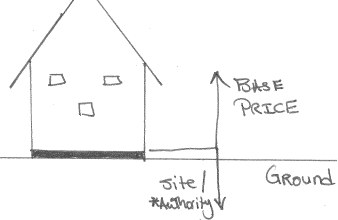Table of Contents
In most of my blogs, I tackle my topics from the client’s perspective to help you gain a better insight and make more informed decisions. However in this blog, it’s important that I address both perspectives: the builder’s and the client’s perspectives so we can better understand the difference between fixed and locked pricing.
What is a Fixed Price Tender?
A fixed price tender is a document that the builder provides you, the client, outlining the specifications / inclusions / etc… and a price that does not and will not change.
A fixed price tender takes into account all of your site, authority and any other costs to build your home. Essentially, you do not pay anymore money unless YOU, the client, make changes to your site or design or inclusions.
Let’s say that the builder accommodates for (after their assessments) that you will only need 45 meters of temporary fencing. Assume that your right-hand neighbor start construction at the same time that you do. So your builder will not need some the temporary fencing that he initially assessed he would need. Are you then entitled to a refund?
Let’s look at another example: during the initial assessment that your rear neighbor had a fence. What happens if your rear neighbor takes down his fence? Does the builder then get to charge you more for the extra rear fence now that it is not there?
As a client, you have to understand that your fixed tender price is based on reporting & survey results as well as assumptions that your builder makes based on their extensive expertise.
So if you want a fixed price upfront, whatever price you agree on IS the price. You have to trust your builder to provide you with a fixed price tender and that is the final price you pay for your build.
Now a lot of factors come into plan when you obtain a fixed price tender from your builder. One thing to be careful of though is the fact that a lot of builders use the words “fixed price” deceptively – so be careful!
What is a Locked Price Tender?
Please do NOT confused locked price with a fixed price. Locked Pricing is NOT a fixed price, rather a Locked Price tender locks today’s price for a specified period of time.
The cost of doing business goes up including material and labour. So it’s preferable to lock in today’s price when you are engaging a home builder.
Let’s assume that your land registers in 12 months from today. The cost of construction in 12 months will likely be more than it is today, so you ask your builder to lock today’s price to mitigate your risk of the increased construction costs.
Who sources the land?
Client’s Owned Land
If you owned your own land and you want to build a home on it, then the onus is on you to make sure that your builder is able to obtain everything they need to fix and lock in your pricing.
It’s important to understand that if a builder locks in you price, this does not mean the builder is giving you a fixed price. The only way the builder can provide you with a truly fixed price; is when they can obtain all the necessary reports and surveys.
If you land is not registered, then the builder will make certain assumptions based on the developer’s documentation. Once the land registers, the builder will obtain the necessary reports and surveys. If any of the initial assumptions are not correct, then you will most likely receive a price variation.
For example, the builder sites your home and have your Finished Floor Levels & Drop Edge Beams finalized based on your developer’s contours. When your land registers and the contours of the land change, then it’s perfectly reasonable to adjust the pricing to accommodate for the changed contours. It is your land after all!
This concept applies to both registered and unregistered land. Unfortunately some builders use this as an opportunity to get you in at a low lead-in price and charge you more once your land is registered.
This is to make up for the upfront low price regardless of whether your site conditions have changed or not. It’s really important that you engage a reputable builder and understand any extra costs in details.
House & Land Packages
Having said that, if you are buying a home & land package then the builder is 100% liable for fixing and locking in your price. They have sourced you the land and hence they share a level of responsibility with you.
When I sell our home & land packages, I must sell you all the benefits. I also fix the price (non-negotiable) and lock it for 6 months after expected land registration. This is important for a couple of reasons:
- We sourced the land, so if we are selling a home & land package, we ought to fix the price
- Given that it takes time to get started on site, we provide for at least 6 months lockin period for our clients
Which is better?
Fixed price and Locked price are two completely different things, so comparison in that respect does not work. They may look or sound the same but they are NOT.
In an ideal world, you would have your price fixed and locked for a period of time.
Why?
Fixed Pricing is really important for your peace of mind. This is specially important; if you have a limited budget and cannot afford to spend a surprise price variation of $50,000 from your builder.
Personally, I would rather pay more upfront knowing that my price is fixed rather than play the game of “let’s increase the price as we go”. It’s not a fun game to play.
Locked Pricing is important but must be used in conjunction with Fixed Pricing. Otherwise the builder will just make up the price to lure you in; then they will lock in that made-up price.
This will then become a pointless exercise and you will most likely be trapped in this situation because you are most likely making decisions based on “who can give me the cheapest price?”.
A Note
As a client, it’s important for you to understand the differences between fixed pricing and locked pricing. This will help you work with your builder far better and provide you with a smoother building journey. It’s also important to understand that pricing of material and labour goes up all the time. Expecting your builder to lockin your price forever is not fair either, so make sure you agree on lockin period upfront and understand their ongoing charge rates should you need to extend your tender.









